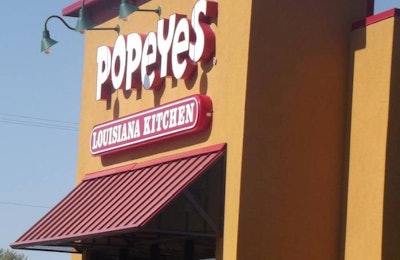
When Restaurant Brands International (RBI), the parent company of Burger King and Tim Hortons, pledged to remove antibiotics also used in human medicine from its broiler supply by 2018, the goal seemed ambitious but still attainable. Then, when the company announced it would move its entire broiler supply to slower-growing breeds raised according to Global Animal Partnership (GAP) standards, it seemed even more ambitious.
RBI’s antibiotic-related announcement was made in December 2016. Then, in February 2017, RBI announced its intent to purchase chicken quick-service restaurant (QSR) chain Popeyes. Suddenly, the company’s demand for broiler chicken became much larger, and reaching that goal seemed a little more difficult.
However, the GAP broiler commitment was made after RBI committed to acquire Popeyes, but before the transaction was finalized in March.
Will antibiotics policy include Popeyes?
RBI had not revealed any specific plans as to whether the antibiotic policy would apply to Popeyes, and I could find no specific information on the RBI 2016 Sustainability Report, which includes some information about Popeyes.
However, Reuters Canada recently reported that RBI had stated that it intended to apply the antibiotics policy to all brands over time, and it can be interpreted that “all brands” encompasses Popeyes. However, no specific time-related goals were mentioned.
What about slower-growing broilers for Popeyes?
The sustainability report mentions RBI’s plans to transition its broiler supply to be raised according to GAP standards. The sustainability report mentions RBI’s GAP ambitions without specifically mentioning any restaurant brands.
With projections that retail prices for chicken meat from slower-growing broilers will cost dramatically more than that from traditional broilers, it seems like it would not behoove RBI to pledge to GAP standards for any of its brands. (The sustainability report mentions RBI’s GAP ambitions without specifically mentioning any restaurant brands.) However, this is more true for Popeyes than any other of RBI’s brands.
To date, no other chicken QSR has agreed to source its entire supply according GAP standards. They have been wise. Should RBI choose to steer Popeye’s down this road, it will be a bad choice. The argument could be made that it would be good for the company to have a supply of traditional broilers and of slower-growing broilers, as that would enable choice and could be beneficial. But to commit the entire supply is another story.
Burger King and Tim Hortons may be better able to navigate through an exclusive slower-growing broiler switch as the company has a more diverse menu with other animal proteins offered.
But if you eat at Popeyes and will have protein included in your order, you are pretty well limited to chicken.
Despite what proponents of the slower-growing broiler movement say, and what foodservice companies who have caved to pressures to make the transition have said, there isn’t a big consumer push for this.
Yes, nearly all chicken consumers want chickens to be raised as humanely as possible, as do nearly all egg consumers. But there have been repeated reports of an oversupply of cage-free eggs as the demand isn’t what it was made out to be. You can surely expect this to be the same scenario with more expensive broilers raised according to GAP standards.
So if Popeyes takes the GAP route, it is entirely plausible, and possibly even certain, that consumers on a budget who want chicken served quickly will skip over slower-growing chicken at Popeyes, and will instead pull into Church’s or KFC for a more affordable option.
Is RBI in over its head with purchase pledges?
Presently, there is not an ample supply of chickens raised according to GAP standards to meet the commitments made so far. Several broiler companies have moved in this direction, with Wayne Farms launching a line of GAP Step 2 Rated line of chicken products, and Hormel Foods’ Applegate committing to GAP standards. But if other companies refuse to do so, then the pledges by RBI and other companies will be unattainable.
Speaking at the recent Animal Agriculture Alliance Stakeholders Summit, Tim McIntyre, Domino’s executive vice president of communication, investor relations and legislative affairs, noted that while the company he is affiliated with has made no such commitments, others may wish they hadn’t been so hasty to give into the pressures advocates of perceived animal welfare standards have placed upon them.
RBI could very well fit that description.
Learn more about the slower-growing broiler issue
Poultry industry professionals can learn more about animal activists’ push for slower-growing broilers at the 2017 Chicken Marketing Summit. The event will include a panel of experts with experience communicating with activists, buyers and consumers to discuss the issues and the types of conversations that poultry marketers need to be having with both consumers and poultry buyers.
The Chicken Marketing Summit will be held July 16-18 at the Grove Park Inn, Asheville, North Carolina. For more details on the Chicken Marketing Summit, please visit www.wattglobalmedia.com/chickenmarketingsummit.


















